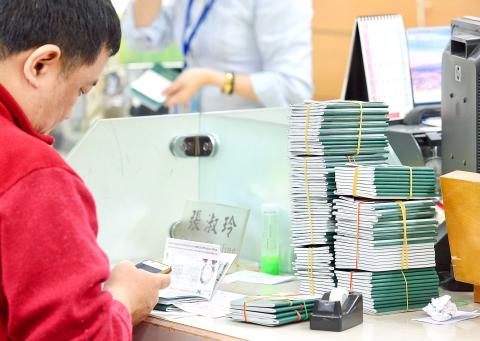There should be no technical obstacles to adding a third gender option to passports as long as the Ministry of the Interior approves such an option for household registration and national identification purposes, the Ministry of Foreign Affairs said yesterday.
The issuance of passports is conditional on the issuance of national identification cards, so if the interior ministry decides to include a third gender option, the foreign ministry would make the same change to passports, foreign ministry spokesman Andrew Lee (李憲章) said at a news conference.
Several countries have introduced an “X” — “unspecified” — gender option on passports, including Canada, Australia, New Zealand, Malta, Nepal and Denmark, according to the International Civil Aviation Organization (ICAO).

Photo: Peter Lo, Taipei Times
If the government were to make new policy on the matter, the Department of Household Registration would make changes as required, department Director Chang Wan-yi (張琬宜) said.
The Executive Yuan’s Gender Equality Committee yesterday said it is working to introduce a third gender option on identity documents to protect the rights of transgender, intersex and other gender-diverse individuals.
The government has decided to add a third gender option, the committee said, adding that it is checking related laws, regulations and forms and would convene a cross-agency meeting to discuss specifics as soon as possible.
The policy involves several agencies and the committee predicts that multiple discussions would need to be held, it said.
In September last year, Minister Without Portfolio Lin Wan-I (林萬億) convened a meeting and instructed agencies to check laws, regulations and forms, the committee said.
Minister without Portfolio Lo Ping-cheng (羅秉成) is now responsible for supervising the preparatory work, it said.
After the examination, Lo is to convene a cross-agency meeting to discuss specifics and the short, medium and long-term goals of the policy, it added.
Further discussions are needed to decide on a timetable for the policy, the committee said.

Taiwan is to commence mass production of the Tien Kung (天弓, “Sky Bow”) III, IV and V missiles by the second quarter of this year if the legislature approves the government’s NT$1.25 trillion (US$39.78 billion) special defense budget, an official said yesterday. Commenting on condition of anonymity, a defense official with knowledge of the matter said that the advanced systems are expected to provide crucial capabilities against ballistic and cruise missiles for the proposed “T-Dome,” an advanced, multi-layered air defense network. The Tien Kung III is an air defense missile with a maximum interception altitude of 35km. The Tien Kung IV and V

The disruption of 941 flights in and out of Taiwan due to China’s large-scale military exercises was no accident, but rather the result of a “quasi-blockade” used to simulate creating the air and sea routes needed for an amphibious landing, a military expert said. The disruptions occurred on Tuesday and lasted about 10 hours as China conducted live-fire drills in the Taiwan Strait. The Civil Aviation Administration (CAA) said the exercises affected 857 international flights and 84 domestic flights, affecting more than 100,000 travelers. Su Tzu-yun (蘇紫雲), a research fellow at the government-sponsored Institute for National Defense and Security Research, said the air

Trips for more than 100,000 international and domestic air travelers could be disrupted as China launches a military exercise around Taiwan today, Taiwan’s Civil Aviation Administration (CAA) said yesterday. The exercise could affect nearly 900 flights scheduled to enter the Taipei Flight Information Region (FIR) during the exercise window, it added. A notice issued by the Chinese Civil Aviation Administration showed there would be seven temporary zones around the Taiwan Strait which would be used for live-fire exercises, lasting from 8am to 6pm today. All aircraft are prohibited from entering during exercise, it says. Taipei FIR has 14 international air routes and

Taiwan lacks effective and cost-efficient armaments to intercept rockets, making the planned “T-Dome” interception system necessary, two experts said on Tuesday. The concerns were raised after China’s military fired two waves of rockets during live-fire drills around Taiwan on Tuesday, part of two-day exercises code-named “Justice Mission 2025.” The first wave involved 17 rockets launched at 9am from Pingtan in China’s Fujian Province, according to Lieutenant General Hsieh Jih-sheng (謝日升) of the Office of the Deputy Chief of the General Staff for Intelligence at the Ministry of National Defense. Those rockets landed 70 nautical miles (129.6km) northeast of Keelung without flying over Taiwan,